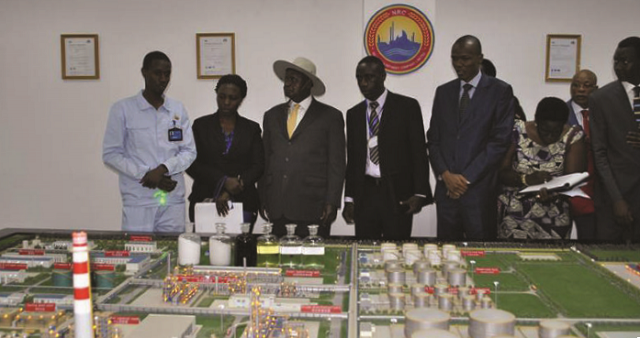
Wrong priorities
Working on a shoe-string budget is every project manager’s nightmare, but Muloni appears to have an additional problem – the little money she has is apparently not budgeted to the right activities, in the right amounts, at the right time.
Take the oil roads component of the project, for example. In total, the roads required under the Hoima-Wanseko project cover 706 Kilometres and require Shs. 2.8 trillion. In the current budget, government has set aside Shs. 1.1 trillion for the 15 oil roads. The remaining Shs. 1.7 trillion will be put in the 2018/19 budget, according government documents.
The Shs1.1 trillion in the next budget for FY2017/18 is meant to cater for 15 roads. But interestingly, in its report on the National Budget Framework Paper (NBFP), the Budget Committee of parliament noted that only two of these roads (Hoima-Butiaba-Wanseko and Lusalira-Nkonge-Ssembabule) have completed feasibility studies and detailed designs. The remaining 13 roads are far from takeoff. Therefore, according to the budget committee, the funds allocated seem excessive. In the end, the money likely to sit idle on the Uganda National Roads Authority (UNRA) account due to challenges associated with the lengthy procurement processes.
The committee also raised concerns that the unit cost of construction per kilometer for Hoima-Butiaba-Wanseko road of Shs 5.9 billion is far above the average cost, which requires UNRA to clarify further.
The government is also struggling to construct an airstrip/ airport at Kabaale and an Industrial park in the same area. The airport needs about US$ 300 million (Approx.1 trillion).
While the British registered joint venture between Colas and SBI appears to be in the lead to get the deal, the project has not been bided for yet and government has not resolved ownership disputes over the land where the project will be. It is hoped the UK could finance it if Colas and SBI get the deal.
The government also needs US$200 million (Approx. Shs716 billion) for other joint venture equity investments with the oil companies in the production phase.
Finally, the government must also raise money for institutions at the forefront of overseeing, controlling, and regulating the oil sector. The main ones are the Uganda National Oil Company (UNOC) and the Petroleum Authority of Uganda (PAU).
In FY 2016/17, the two entities required about Shs42 billion to operate. The government has given PAU just Shs5 billion PAU and UNOC Shs6.2 billion. That is just 30% of their budget.
“This means that they (UNOC and PAU) will not be able to achieve their mandate and this will negatively affect our interests in the oil and gas industry,” a parliament report noted.
Businessman Emmanuel Katongole, who is the chairman of the UNOC board, tried to rationalize the financing shortfall in interview with The Independent at the sidelines of an event organised by the oil companies to launch the Front End Engineering Designs (FEED) for two oil fields.
“Resources are never enough,” he said, “The funding is being done in a phased manner and so far so good.”
He said UNOC has recruited most of the technical staff.
“We are still able to work with what we have been availed,” he said.
Ernest Rubondo, the Executive Director, PAU, also explained to The Independent in a telephone interview that the authority would try and work with the resources allocated. He said funding is limited because the authority is transitioning from being under the Ministry of Energy and the government has many activities it must fund to meet the planned oil production timelines.
Rubondo said, however, the authority requires resources to tackle new challenges like regulating the midstream and downstream phases, which are new phases that his team will be learning about for the first time.
“That requires new knowledge and expertise,” he said, “And you are right acquiring that expertise requires adequate resources and we are hopeful that government will avail these resources.”
Observers fear that the oil sector is a sensitive sector and if the government fails to equip the regulators, oil companies and contractors could take advantage of poor regulation to cause government a lot of revenue losses.
Regarding the oil refinery, the government appears to be finding difficulty to find the right investor. It is also struggling it has its share of any financing requirement —some $ 500 million (Shs1.75 trillion) according to its own estimates.
 The Independent Uganda: You get the Truth we Pay the Price
The Independent Uganda: You get the Truth we Pay the Price



